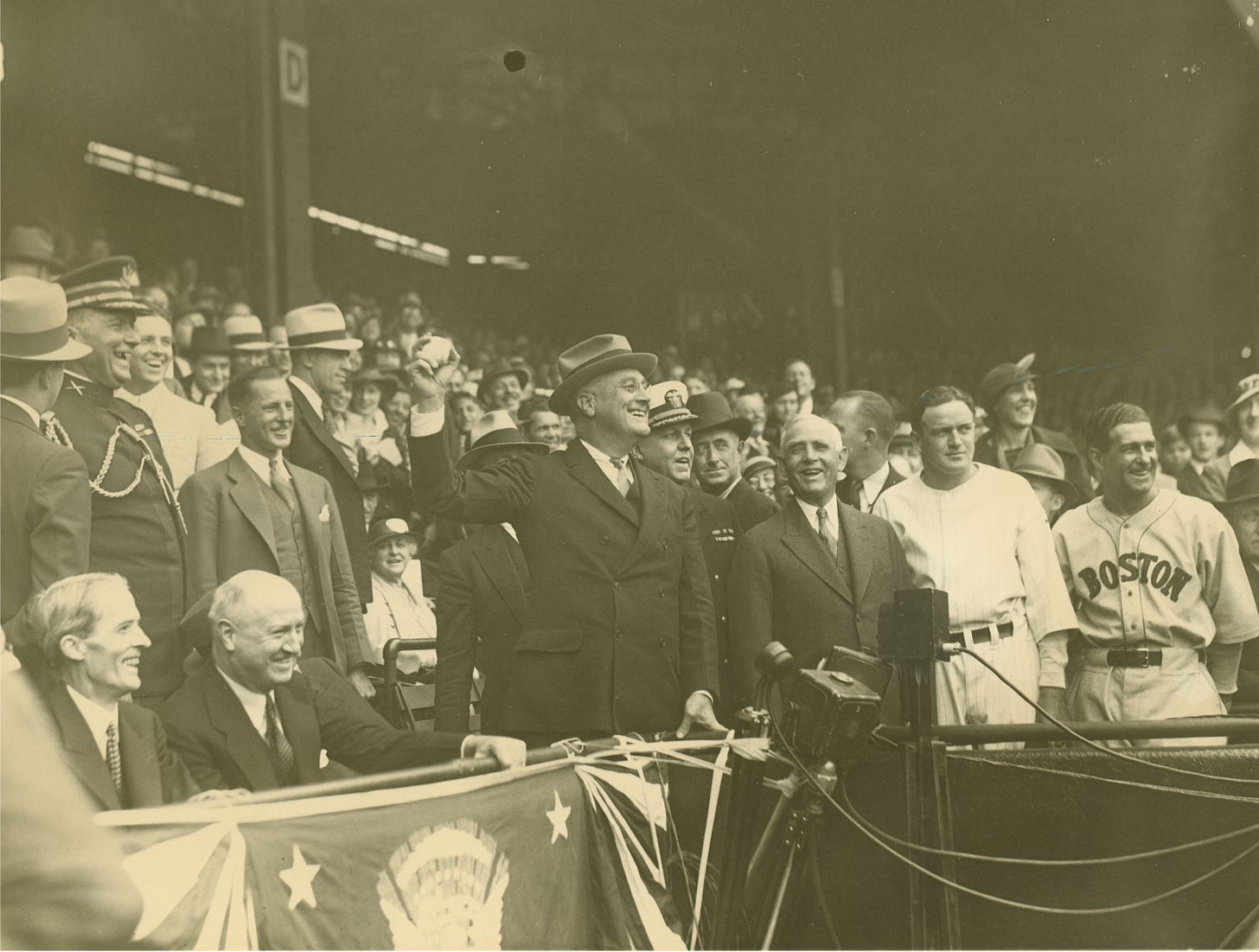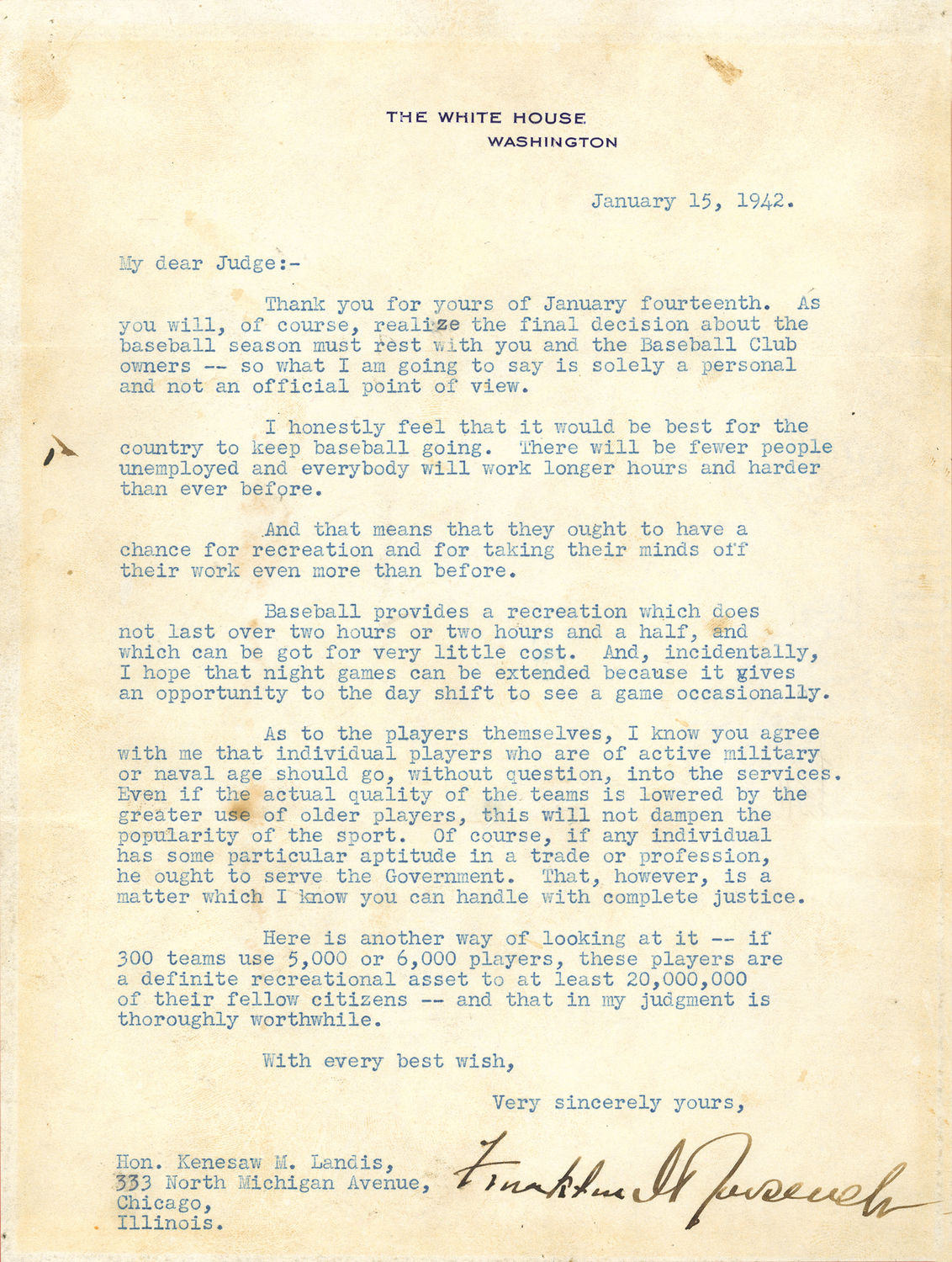FDR gives baseball the green light
When the Pearl Harbor attack thrust the United States into World War II, baseball’s power brokers naturally wondered how the war might affect their game.
All remembered the chaos caused by the “work or fight” edict in the middle of the 1918 season, and they naturally wanted to know where their sport stood in the government’s eyes before the 1942 season got underway.
On Jan. 14, 1942, baseball commissioner Kenesaw Mountain Landis wrote President Franklin D. Roosevelt a letter seeking his input on whether teams should go forward with spring training: “I venture to ask what you have in mind as to whether professional baseball should continue to operate.”
Roosevelt responded the following day with what became known as the “Green Light Letter,” giving his blessing to the sport as a whole but noting that he expected individual players to do their part in the war effort.
“I honestly feel that it would be best for the country to keep baseball going,” Roosevelt wrote. “There will be fewer people unemployed and everybody will work longer hours and harder than ever before. And that means that they ought to have a chance for recreation and for taking their minds off their work even more than before.
“Baseball provides a recreation which does not last over two hour or two hours and a half, and which can be got for very little cost. And, incidentally, I hope that night games can be extended because it gives an opportunity to the day shift to see a game occasionally.”
The president noted at the top that this was solely his personal opinion, not an official government policy, but Roosevelt’s sign-off was all the game really needed.
The letter went public on Jan. 16 and was front-page news in many papers. Across the country, sports columnists weighed in on the president’s approval, expressing relief that the season could move forward with some degree of clarity about its future.
As Chester L. Smith wrote in the Pittsburgh Press, “a veil of uncertainty is lifted from the professional sport which involves the heaviest investment of them all.”
He continued:
Baseball had no intention of shutting up shop until the order came through or it was economically impossible to carry on any longer, but there is no doubt it was suffering from a severe attack of nerves, simply because it was walking in the dark.
It isn’t the most comfortable sensation in the world to head into a black alley with a satchel of money and no assurance of what is at the other end, which is exactly what the major and minor leagues were doing until Mr. Roosevelt turned on the light.
Now there is no longer any doubt regarding what is ahead; there will be baseball, even though it may be played with over-age veterans and under-age freshmen in the key roles.
Smith proved prescient there, as the war years would see dozens of players who otherwise wouldn’t have had a chance to play in the majors suit up at the highest level. The Cincinnati Reds, for instance, pitched 15-year-old Joe Nuxhall in a game in 1944, then had 46-year-old pitcher Hod Lisenbee on their roster throughout 1945, making 31 appearances.
Though the product on the field unquestionably deteriorated, particularly during those last two wartime seasons, the bottom line was that baseball was able to continue, providing a welcome dose of normalcy in unprecedented times.
Coming on the heels of several high-profile sporting events being called off or reconfigured — the Rose Bowl being moved to Durham, North Carolina, for instance — many celebrated Roosevelt’s green light as a blow against overreaction. Or, as the columnist Bob Considine put it, “a first-class sock at the Nervous Nellies of sport who are frantically calling off traditional athletic events.”
“Now we are betraying no military secret when we say the President knows more about the exact dangers facing this country than any admiral, general, politician, bar-and-grill military strategist or sports official,” Considine continued. “His call for the continuation of baseball is good, reassuring stuff and a swell kick in the slats for the sports alarmists who seem to think the interests of the country can best be served by wiping out athletic activity for the duration.”





